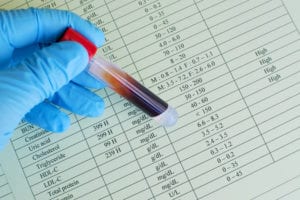Written by Taylor Woosley, Staff Writer. Results of the dose-response meta-analysis including 17 RCTs show that resveratrol supplementation significantly decreased TC (p < 0.001), TG (p < 0.001), and LDL-C (p=0.038). Furthermore, results from the sub-group analysis show that a more significant reduction of LDL-C was observed in trials with a duration of ≥12 weeks.
 Cardiovascular disease, caused by disorders of the heart and blood vessels, are the leading cause of death globally1. Individuals with CVD are found to have the accompanying raised blood pressure, elevated glucose, obesity, lack of exercise, and dyslipidemia2. Dyslipidemia is a metabolic abnormality leading to an increase in circulating concentrations of blood total cholesterol (TC) and triglycerides (TG) and is characterized by elevated low-density lipoprotein cholesterol (LDL-C)3. Lipids and lipoprotein particles crucially contribute to atherosclerosis as underlying pathology of cardiovascular disease and influence inflammatory processes, thereby impacting blood vessels and the heart4.
Cardiovascular disease, caused by disorders of the heart and blood vessels, are the leading cause of death globally1. Individuals with CVD are found to have the accompanying raised blood pressure, elevated glucose, obesity, lack of exercise, and dyslipidemia2. Dyslipidemia is a metabolic abnormality leading to an increase in circulating concentrations of blood total cholesterol (TC) and triglycerides (TG) and is characterized by elevated low-density lipoprotein cholesterol (LDL-C)3. Lipids and lipoprotein particles crucially contribute to atherosclerosis as underlying pathology of cardiovascular disease and influence inflammatory processes, thereby impacting blood vessels and the heart4.
Resveratrol is a natural polyphenol found in red wine and fruits such as blueberries and grapes that plays an important role in a large variety of biological activities5. Studies show that the vasculoprotective benefits of resveratrol include the lowering of oxidative stress and inflammation, enhancing metabolic capacity, suppressing vascular smooth muscle cell (VSMC) proliferation, and promoting autophagy6. Furthermore, resveratrol has been shown to lower low-density lipoprotein-cholesterol (LDL-C) levels, decrease inflammation, increase endothelial function, and reduce cardiac fibrosis7.
Cao et al. conducted a meta-analysis of randomized controlled trials (RCTs) to better assess the effects of resveratrol on lipids and added the dose-response relationship on the effects of resveratrol on lipids. Inclusion criteria consisted of the study being an RCT design and with outcome measures of as least one of the following markers: TC, LDL-C, HDL-C or TG. The final analysis consisted of 17 studies with a total of 968 subjects (18 to 85 years) with the resveratrol dosage ranging from 10 to 3000 mg/day. Significant findings of the 17 study meta-analysis are as follows:
- Regarding TC, the intervention of resveratrol exerted a statistically significant effect on the level of serum TC (Mean difference = -28; 95%CI: -13.79, -6.76, p < 0.001, I2 = 26.7%).
- Results of serum LDL-C using the applied random-effects model shows that resveratrol intake significantly decreased the LDL-C level (Mean difference = -69; 95%CI: -11.07, -0.31, p = 0.038, I2 = 64.2%).
- There was no significant effect of resveratrol supplementation on the HDL-C level (Mean difference = 1.36; 95%CI: -06, 2.79, p = 0.061, I2 = 38.5%).
- Pooled effect size based on 17 studies indicated that resveratrol supplementation significantly reduced the TG level (Mean difference = -56; 95%CI: -12.37, -4.75, p < 0.001, I2 = 0.0%).
- A subgroup analysis of LDL-C shows a significant alteration in LDL-C was observed in trials with ≥500 mg/d resveratrol (Mean difference = 2.44; 95%CI: -21,13.08, p = 0.004), those with a duration of ≥12 weeks (Mean difference = -6.01; 95%CI: -13.26,1.25, p < 0.001), those performed in subjects with T2DM (Mean difference= -4.21; 95%CI: -18.78,10.36, p < 0.001).
Results of the meta-analysis show that resveratrol significantly affected the levels of TC, LDL-C, and TG. However, resveratrol did not affect the level of HDL-C. The nonlinear dose-response analysis observed a significant effect of resveratrol dosage on LDL-C levels. Furthermore, LDL-C reduction was more significant in the trials with ≥12 weeks duration and in subjects with type 2 diabetes mellitus. Study limitations include the varied dosages and durations of studies used in the meta-analysis, the inability to distinguish whether a gender difference existed in response to resveratrol supplementation, the observed publication bias on the HDL-C data, and the chance that resveratrol supplementation may have been used with medical drugs which may alter the effects of resveratrol on subjects.
Source: Cao, Xinyi, Wang Liao, Hui Xia, Shaokang Wang, and Guiju Sun. “The Effect of Resveratrol on Blood Lipid Profile: A Dose-Response Meta-Analysis of Randomized Controlled Trials.” Nutrients 14, no. 18 (2022): 3755.
© 2022 by the authors. Licensee MDPI, Basel, Switzerland. This article is an open access article distributed under the terms and conditions of the Creative Commons Attribution (CC BY) license (https:// creativecommons.org/licenses/by/ 4.0/).
Click here to read the full text study.
Posted October 26, 2022.
Taylor Woosley studied biology at Purdue University before becoming a 2016 graduate of Columbia College Chicago with a major in Writing. She currently resides in Glen Ellyn, IL.
References:
- Zhu Y, Bo Y, Liu Y. Dietary total fat, fatty acids intake, and risk of cardiovascular disease: a dose-response meta-analysis of cohort studies. Lipids Health Dis. Apr 6 2019;18(1):91. doi:10.1186/s12944-019-1035-2
- Tian D, Meng J. Exercise for Prevention and Relief of Cardiovascular Disease: Prognoses, Mechanisms, and Approaches. Oxid Med Cell Longev. 2019;2019:3756750. doi:10.1155/2019/3756750
- Trautwein EA, McKay S. The Role of Specific Components of a Plant-Based Diet in Management of Dyslipidemia and the Impact on Cardiovascular Risk. Nutrients. Sep 1 2020;12(9)doi:10.3390/nu12092671
- Soppert J, Lehrke M, Marx N, Jankowski J, Noels H. Lipoproteins and lipids in cardiovascular disease: from mechanistic insights to therapeutic targeting. Adv Drug Deliv Rev. 2020;159:4-33. doi:10.1016/j.addr.2020.07.019
- Malaguarnera L. Influence of Resveratrol on the Immune Response. Nutrients. Apr 26 2019;11(5)doi:10.3390/nu11050946
- Breuss JM, Atanasov AG, Uhrin P. Resveratrol and Its Effects on the Vascular System. Int J Mol Sci. Mar 27 2019;20(7)doi:10.3390/ijms20071523
- Dyck GJB, Raj P, Zieroth S, Dyck JRB, Ezekowitz JA. The Effects of Resveratrol in Patients with Cardiovascular Disease and Heart Failure: A Narrative Review. Int J Mol Sci. Feb 19 2019;20(4)doi:10.3390/ijms20040904
